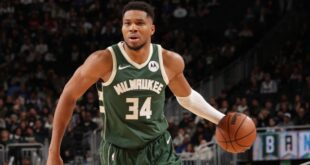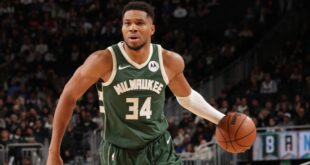No need for apologies.
There was no expectation for the Minnesota Timberwolves to issue any, and the Golden State Warriors, having seen their postseason hopes dashed without scoring star Stephen Curry, weren’t looking for any either. Curry was sidelined in street clothes for the last four games, resulting in all losses for the Warriors.
The left hamstring strain that Curry sustained during the second quarter of Game 1 transformed the dynamics of their Western Conference semifinals matchup in multiple ways. Few teams can afford to lose their top offensive talent—one of the most formidable weapons in NBA history—even at 37 years old—without experiencing a significant decline.
In very straightforward terms, Golden State was ahead 30-20 when Curry exited, marking the end of his season. From that moment on, the Timberwolves outscored them by 46 points.
Such a disparity is clear, highlighted by their 4-1 series victory over the Warriors, who advanced through the SoFi Play-In Tournament. Would Curry have managed to score 46 points in the time he sat out? Certainly. However, Minnesota may have adjusted their strategies as well. Playoff series often resemble complex equations, with variables stacking upon one another.
“Injuries are part of the playoff experience,” remarked Golden State head coach Steve Kerr. “There’s no use in fixating on it. I want to commend what Minnesota has achieved.”
The Timberwolves are headed back to the Western Conference Finals for the best postseason performance in franchise history. They were eliminated by Dallas in 2024 following a dramatic Game 7 against defending champion Denver.
Reflecting on their journey, they believe they are now better prepared for this experience.
“Did we truly earn the right to be a Western Conference Finals team, or did we just stumble into it?” asked Minnesota coach Chris Finch, presenting a challenge to the team as they gear up for the 2025 playoffs.
“Golden State experienced a significant loss, which heavily impacted the series. I’m certain the outcome would have been different if Steph had been able to play. But our players rose to the occasion.”
Here are five key insights from the Timberwolves’ 121-110 triumph on Wednesday night at Target Center as they await the outcome of the Oklahoma City-Denver series.
The inconsistencies in Julius Randle’s initial season with Minnesota and his lackluster playoff history did not foreshadow the standout performances he delivered in this series—or indeed, in his remarkable playoff journey thus far.
Acquired just before training camp alongside Donte DiVincenzo in a surprising trade that sent Karl-Anthony Towns to New York, Randle emerged as Minnesota’s top performer against the Warriors. His timely scoring, crucial rebounding, his knack for creating offensive opportunities, enabling Anthony Edwards to thrive off the ball, and his defensive contributions were vital.
Throughout the first four games of the series, Randle averaged 24.3 points, 6.3 rebounds, and eight assists. In the series-clinching game, he recorded 21 points, eight rebounds, and five assists, shooting an impressive 9-for-12, all while flashing his characteristic, vibrant demeanor.
Randle has reached 20 or more points in eight of the Timberwolves’ ten playoff games. He and DiVincenzo can breathe a sigh of relief knowing that Minnesota has at least matched their performance from last spring with Towns. But rather than looking at it half-empty, Randle’s contributions have been exceptional.
“The way he controlled the pace and pushed the tempo,” Edwards said, singing Randle’s praises. “His defense has improved significantly. His communication and attention to detail are remarkable.”
Jimmy Butler entered the series with a bruised glute, a consequence of hitting the floor hard in Game 2 of the first round against Houston. He was reportedly feeling unwell during Game 4.
Nevertheless, Butler sought no excuses for himself, insisting he was ready to compete.
“I was good enough to play,” he stated after Wednesday’s game.
Butler offered Golden State new dimensions—his steady pace, passing skills, and free-throw proficiency—bringing renewed hope to a fading dynasty. Alongside Curry, he formed a dynamic duo where each player’s style complemented the other.
However, what the 35-year-old Butler couldn’t do was carry the team. The leader who propelled the Heat to the NBA Finals in 2020 and 2023 could not step up effectively after Curry’s injury. His absence as a deep threat limited the Warriors’ offensive space.
Yes, Butler averaged 20.2 points over five games, but he shot 43% and had a negative plus-minus rating. Golden State was outscored by 37 points during his time on the floor but performed one point better overall while he rested.
Last year, as the Timberwolves pushed toward the Western Conference Finals, veteran point guard Mike Conley was vocal in urging his teammates to advance for his sake.
“I told the guys to, selfishly, do it for me, man,” Conley admitted then, mixing challenge with sincerity.
Now, in his 17th season and a year older, Conley heeded his own advice. Once again, he is headed to the West Finals.
Despite a slow start with just 6.0 points and 4.3 assists on a poor 7-for-28 shooting over the first four games, Conley scored 16 points in this decisive game, making four three-pointers to join his teammates as a reliable scorer in double figures.
As the Timberwolves aim for another chance at the Western Conference Finals, veteran Mike Conley is stepping up in all the right ways.
The old adage that statistics can be misleading was evident on Wednesday. Kerr highlighted various aspects where Golden State outperformed Minnesota—possession counts, field goal attempts, three-point shooting, rebounding stats, and forced turnovers, all areas he had emphasized.
The Warriors excelled in these categories yet lost by a significant margin due to one glaring statistic their defense failed to contain. The Timberwolves shot incredibly well, hitting 62.8% of their shots and 41.9% from beyond the arc. Even with Minnesota’s 21 turnovers—one of their highest totals all season—they managed to keep the Warriors at bay, maintaining an 11-point lead in the final quarter.
We may never know if Curry could have returned for Game 6. Speculating on whether a few extra days of rehab would have helped remains uncertain. He can take his time to recover this offseason, as best as his leg will allow.
And perhaps that’s for the best. Some Golden State fans may disagree, but did they truly want to see the future Hall of Famer jeopardize his long-term health by rushing back due to team obligations?
The NBA has already witnessed injuries this postseason, with Boston’s Jayson Tatum and Milwaukee’s Damian Lillard sidelined by Achilles tendon ruptures. Cleveland faced multiple injuries when they were eliminated in five games by Indiana. The last thing that Curry, the Warriors, or the league needed was another catastrophic injury similar to Kevin Durant’s Achilles tear, which happened during the 2019 Finals due to his premature return to play.
* * *
Steve Aschburner has been covering the NBA since 1980. You can reach him via email here, explore his archive here, and follow him on X.
The opinions expressed on this page do not necessarily reflect those of the NBA, its teams, or Warner Bros. Discovery.
 NBA News NBA News, Match Reports and Updates
NBA News NBA News, Match Reports and Updates



